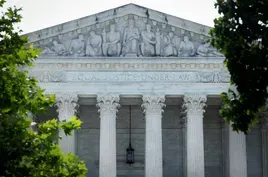
Laws on tracking gun sales highlight divide between states
Clip: 7/2/2024 | 6m 34sVideo has Closed Captions
New laws on tracking gun sales highlight divide between blue and red states
Conflicting laws around the purchase of firearms are taking effect across different states. In California, credit card companies must provide banks with retail codes for gun stores in order to help track their sales. But the opposite is happening in four states where it is now illegal for banks and credit card companies to track that information. Stephanie Sy discussed more with David Leib.
Problems with Closed Captions? Closed Captioning Feedback
Problems with Closed Captions? Closed Captioning Feedback
Major corporate funding for the PBS News Hour is provided by BDO, BNSF, Consumer Cellular, American Cruise Lines, and Raymond James. Funding for the PBS NewsHour Weekend is provided by...

Laws on tracking gun sales highlight divide between states
Clip: 7/2/2024 | 6m 34sVideo has Closed Captions
Conflicting laws around the purchase of firearms are taking effect across different states. In California, credit card companies must provide banks with retail codes for gun stores in order to help track their sales. But the opposite is happening in four states where it is now illegal for banks and credit card companies to track that information. Stephanie Sy discussed more with David Leib.
Problems with Closed Captions? Closed Captioning Feedback
How to Watch PBS News Hour
PBS News Hour is available to stream on pbs.org and the free PBS App, available on iPhone, Apple TV, Android TV, Android smartphones, Amazon Fire TV, Amazon Fire Tablet, Roku, Samsung Smart TV, and Vizio.
Providing Support for PBS.org
Learn Moreabout PBS online sponsorshipAMNA NAWAZ: New and conflicting laws around the purchase of firearms are taking effect across different states this week.
In California, the law now requires credit card companies to provide banks with special retail codes for gun stores in order to help track their sales.
But just the opposite is happening in Georgia, Iowa, Tennessee, and Wyoming, where it is now illegal for banks and credit card companies to track that information.
Stephanie Sy has more on that story and joins us now -- Stephanie.
STEPHANIE SY: Amna, credit cards have been used to buy guns in some of the nation's deadliest mass shootings.
In 2012, the gunman in the Aurora, Colorado, movie theater shooting charged $11,000 to buy guns, ammunition and tactical gear.
In 2016, the Pulse nightclub shooter in Orlando put more than $20,000 on credit cards.
And, in 2017, after the Las Vegas massacre killed 59 people, police found four credit cards that the shooter used to pay for part of his $95,000 rampage.
This new front in tackling mass shootings has divided conservative and liberal states.
For more, I'm joined by David Lieb, who's been covering this for the Associated Press.
David, thank you so much for joining the "News Hour."
Can you just briefly remind us how merchant codes work?
Are those what you see in your end-of-year credit card statements that give you an idea, for example, of how much you spent on groceries or clothes?
DAVID LIEB, Associated Press: Yes, exactly.
That is probably the most common way that a consumer would be familiar with these.
A merchant category code is set by the International Organization of Standardization.
That's a big mouthful, but that's a group that sets standards for a variety of fields across the world, actually.
So they have come up with a new four-digit code that can be assigned to stores that primarily sell guns and ammunition.
STEPHANIE SY: How specific is this code?
Is it one code?
And can a credit card company tell whether you bought a gun from Walmart or a sporting goods store?
And is having that information, potentially sharing it a privacy violation?
DAVID LIEB: So these codes are shared by credit card networks like Visa or Mastercard with banks that issue credit cards and which have accounts with businesses.
It's the banks that then in turn decide how to categorize particular businesses.
So, until now, a place that sold guns, say, a Walmart that sold guns, was probably not categorized as a gun store, probably a general merchandise store, and still might be categorized as a general merchandise store.
Where this code comes into play is for stores that specialize in guns.
Those stores now would get this new code.
And so, when someone buys something from one of those stores, it will show up as a gun store purchase.
But they won't be able to tell whether you bought a gun, ammunition, a gun safe, or perhaps hunting apparel, like an orange hunting vest.
STEPHANIE SY: So why do states like California believe this could combat mass killings?
Companies already have the names of companies every time there's a transaction.
They already, from what I understand, also have the right to flag that to law enforcement authorities for further investigation.
Why is this needed?
DAVID LIEB: So some state officials and gun control activists hope that, by categorizing particular stores as gun stores, banks will be able to spot unusual purchasing patterns.
Let's say you're not usually shopping at a gun store, but suddenly you make a large purchase from a gun store, but not just one, but from multiple gun stores, in a short period of time.
That might raise some suspicions.
A financial institution then might flag that suspicious activity to federal or state authorities, who could do further investigation and, gun control activists hope, potentially thwart a crime or a mass shooting.
STEPHANIE SY: Does it lead to unlawful government spying, which is what Republican critics of this type of rule suggest it does?
Are you expecting legal challenges?
DAVID LIEB: Well, that is the fear from gun rights advocates.
And that's why Republican legislators in 17 states now have passed some sort of measure that limits or outright prohibits the assigning of gun store codes to particular retailers.
Their fear is that what might be suspicious to one person is not actually suspicious at all.
Let's take the example of someone who for their job perhaps has to undergo periodic firearms training to make sure that they're still accurate.
Well, that person may go out and buy a large quantity of ammunition for a weekend training session, may be perfectly legal, but it could arise suspicions to someone.
It's scenarios like that that gun rights advocates are concerned about, casting unwarranted suspicion people who have done nothing wrong.
STEPHANIE SY: What you have now is a patchwork of laws that contradict each other, with states like California saying they want this merchant code, and other states saying they prohibit credit card companies from using these codes.
How are the companies going to comply with this patchwork of laws?
DAVID LIEB: Well, Visa, in its latest manual that it distributes to all of its customers, included this new standard and put a footnote on there that said, this is being distributed in compliance with California law.
But only the banks and financial institutions in California are required to assign this to businesses.
So, yes, the situation exists that, across the country, the very same store in one state might be categorized as a gun shop, but in another state it might still be categorized as a sporting goods store.
STEPHANIE SY: It is certainly a development that we will continue to follow, especially as we reach peak summer, when we often see a lot of gun violence in cities.
David Lieb with the Associated Press, thanks so much for joining us.
DAVID LIEB: Glad to be here.
Abortion restrictions disproportionately impact Black women
Video has Closed Captions
How abortion restrictions have disproportionately impacted Black women (8m 57s)
A Brief But Spectacular take on dreaming of home
Video has Closed Captions
A Brief But Spectacular take on dreaming of home (3m 19s)
Grateful Dead drummer on the role rhythm plays in his art
Video has Closed Captions
Grateful Dead drummer Mickey Hart combines music and art at the Las Vegas Sphere (6m 6s)
Historian discusses Supreme Court's immunity decision
Video has Closed Captions
Historian discusses Supreme Court's immunity decision and shift in presidential powers (6m 6s)
Israel launches new assault on Khan Younis
Video has Closed Captions
Israel launches assault on Khan Younis after previously claiming it destroyed Hamas there (7m 34s)
Scottish oil town hopes to be Europe’s green energy capital
Video has Closed Captions
Scottish oil town hopes to be Europe’s green energy capital with transition to renewables (8m 28s)
Providing Support for PBS.org
Learn Moreabout PBS online sponsorshipSupport for PBS provided by:
Major corporate funding for the PBS News Hour is provided by BDO, BNSF, Consumer Cellular, American Cruise Lines, and Raymond James. Funding for the PBS NewsHour Weekend is provided by...

















